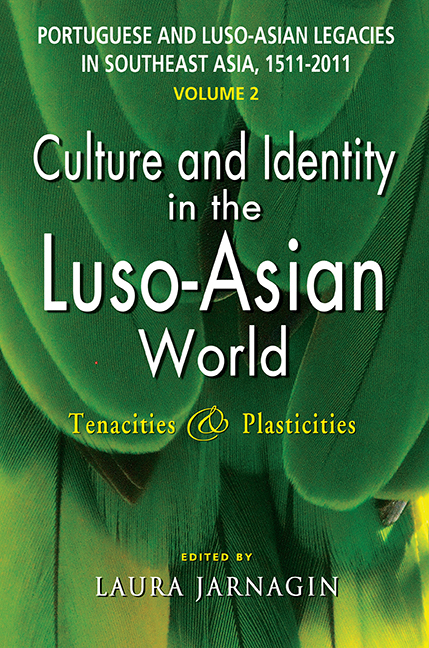 Portuguese and Luso-Asian Legacies in Southeast Asia, 1511-2011, vol. 2
Portuguese and Luso-Asian Legacies in Southeast Asia, 1511-2011, vol. 2 Book contents
- Frontmatter
- Contents
- List of Figures and Tables
- Preface
- List of Contributors
- Glossary
- Introduction: The Qualitative Properties of Cultures and Identities
- Part One Crafting Identity in the Luso-Asian World
- Part Two Cultural Components: Language, Architecture and Music
- Part Three Adversity and Accommodation
- 10 Portugal and China: An Anatomy of Harmonious Coexistence (Sixteenth and Seventeenth Centuries)
- 11 “Aocheng” or “Cidade do Nome de Deus”: The Nomenclature of Portuguese and Castilian Buildings of Old Macao from the “Reversed Gaze” of the Chinese
- 12 Enemies, Friends, and Relations: Portuguese Eurasians during Malacca's Dutch Era and Beyond
- Appendix: Maps
- Bibliography
- Index
- Titles in the Nalanda-Sriwijaya Studies Centre Series
12 - Enemies, Friends, and Relations: Portuguese Eurasians during Malacca's Dutch Era and Beyond
from Part Three - Adversity and Accommodation
Published online by Cambridge University Press: 21 October 2015
- Frontmatter
- Contents
- List of Figures and Tables
- Preface
- List of Contributors
- Glossary
- Introduction: The Qualitative Properties of Cultures and Identities
- Part One Crafting Identity in the Luso-Asian World
- Part Two Cultural Components: Language, Architecture and Music
- Part Three Adversity and Accommodation
- 10 Portugal and China: An Anatomy of Harmonious Coexistence (Sixteenth and Seventeenth Centuries)
- 11 “Aocheng” or “Cidade do Nome de Deus”: The Nomenclature of Portuguese and Castilian Buildings of Old Macao from the “Reversed Gaze” of the Chinese
- 12 Enemies, Friends, and Relations: Portuguese Eurasians during Malacca's Dutch Era and Beyond
- Appendix: Maps
- Bibliography
- Index
- Titles in the Nalanda-Sriwijaya Studies Centre Series
Summary
The Portuguese and the Dutch were age-old enemies, and remnants of the historical, political and religious competition between the two nations can still be found in the culture and heritage of the Portuguese Eurasian community in Malacca. Margaret Sarkissian said it best when she observed that whenever the history of the Malacca Portuguese Eurasian community touches on the Dutch era, people from this community invoke the brief tale of the cruelty of Dutchmen who “inflicted a period of religious persecution upon the hardy Portuguese, reduced them to subsistence fisherfolk, forced them into the jungle for secret church services, but were unable to crush their spirit”.
This is a rather popular point of view that portrays the negative aspects of Malacca Portuguese Eurasians during the Dutch era that is shared by historians and writers from this community, such as the late Bernard Sta Maria and Gerard Fernandis. They, in turn, were much influenced by the views and research of Roman Catholic clerics with whom they had interacted in Malacca. The source of their research is based to a large extent on Portuguese documents, either from primary sources that were translated by those clerics, or from secondary sources obtained by them that were written by Portuguese historians, in the Portuguese language. Although Malacca existed for 160 years under Dutch rule, the disconnection between that community with the Netherlands since 1825 has caused local historians to be greatly deprived of materials and books that would have given them an alternate point of view, namely, from the eyes of the Dutch.
Therefore, when the history of the Malacca Portuguese Eurasian community is re-examined from a Dutch perspective, it can be seen that the Dutch period was not a time of totally rampant persecution and focused discrimination against this community. In fact, some members of the community even enjoyed economic gains and attained some manner of status when they were associated with the Dutch. It is the purpose of this study, therefore, to bring such a perspective to bear on the subject, in particular one that is informed by Malaccan church documents.
- Type
- Chapter
- Information
- Portuguese and Luso-Asian Legacies in Southeast Asia, 1511-2011, vol. 2Culture and Identity in the Luso-Asian World: Tenacities & Plasticities, pp. 257 - 272Publisher: ISEAS–Yusof Ishak InstitutePrint publication year: 2012
